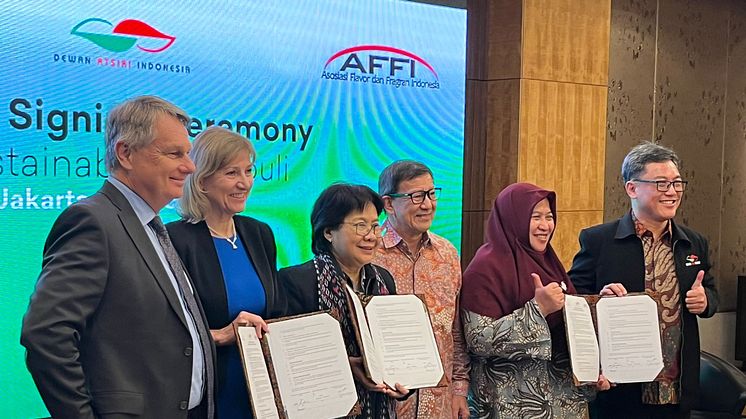
Press release -
Joint Press Release: IFRA, DAI, and AFFI to develop a Best Practice Case Case Study on Patchouli to demonstrate Sustainable Solutions for the Fragrance Industry
Jakarta, 7 March 2023 – The International Fragrance Association (IFRA), together with the Indonesian Essential Oil Council (DAI) and the Indonesian Flavor and Fragrant Association (AFFI), have formed a partnership to develop and document a best practice case study for responsible sourcing of patchouli in Indonesia.
"This collaborative project aims to address sustainability issues throughout the fragrance value chain, in partnership with the essential oil industry, and with a particular focus on patchouli and its derivatives. The project will involve industry players, academic and research institutions, local communities, and farmers from various regions in Indonesia to ensure its successful implementation," said Irdika Mansur, the Chairman of the Indonesian Essential Oil Council, during the Memorandum of Understanding (MoU) signing of the Sustainable Patchouli, in Jakarta, Tuesday 7 March 2023.
As a sign of the beginning of the partnership, three parties signed the Sustainable Patchouli Memorandum of Understanding (MoU), namely Irdika Mansur, the Chairperson of the Indonesian Essential Oil Council, Martina Bianchini, the President of IFRA, and Hanny Wijaya, the President of AFFI.
IFRA President Martina Bianchini stated: As a global organization, IFRA has a long-standing commitment to the safe use of fragrances in daily life. IFRA, together with the International Organization of the Flavor Industry (IOFI), launched a Sustainability Charter establishing a collective framework to address sustainability issues and opportunities along the value chains of the flavor and fragrance industry.
"Entering our 50th anniversary, we strive to be a model of global collaboration on the safe use offragrance, from responsible sourcing to finished consumer goods. IFRA will continue to support the fragrance industry developments worldwide through the safe and sustainable use of fragrances.
Ms Bianchinistated that IFRA supports capacity building for sustainable sourcing practices of fragrance ingredients. The objective of this partnership is to increase learning, education and prosperity through the study, acting responsibly to protect consumers and the environment. As part of this effort, IFRA will fund the case study of patchouli in Indonesia until the end of 2024.
Irdika Mansur, the Chairman of the Indonesian Essential Oil Council, also noted that this multi-stakeholder cooperation represents a strategic step for DAI in advancing the essential oil industry as a key raw material providerfor flavors and fragrances in Indonesia. "This patchouli project will benefit all stakeholders in the essential oil industry," he added.
On this occasion, Hanny Wijaya, the President of AFFI, stated “Being a national association member of IFRA (International Fragrance Research Association) AFFI is supporting the Sustainability Charter initiative from IFRA and IOFI, therefore AFFI is well positioned to extend the needs and interests of the flavor and fragrance industry in Indonesia in practically all aspects of the Project and do so with the cultural understanding and local wisdom in the executions of duties and responsibilities in the Project. At the same time, due to its long association with and involvement in DAI’s works in promoting, facilitating and advocating the Indonesian essential oils industry, we also have a pretty comprehensive understanding of the challenges faced by growers, distillers, producers and marketers/exporters of essential oil products, including Patchouli, and contribute to sustainable solutions.
During its implementation, DAI will coordinate with relevant stakeholders to ensure that project activities adhere to the sustainability standards agreed upon by all parties. DAI will carry out the patchouli study and development project, and all three parties will document the case studies and best practices for patchouli development as a sustainable source of natural ingredients.
***
Notes for editors
The International Fragrance Association (IFRA) is the global umbrella organization of the fragrance industry. It represents the collective interests of the industry and promotes the safe use of fragrances with the ultimate goal to protect the consumer and the environment.
Dewan Atsiri Indonesia (DAI) is a professional organization/institution that serves as a forum for all stakeholders in the agribusiness and agroindustry sector based on the development of essential oils, flavors, and fragrances. DAI members consist of farmers, distillers/producers, traders/exporters, as well as practitioners, researchers, academics, observers, and relevant government agencies.
Asosiasi Flavor dan Fragran Indonesia (AFFI) is an institution that assists and serves the interests and needs of the Indonesian Flavor and Fragrance Industry.
For further information, contact:
- Arianto Mulyadi
Phone : 0811 965 808
Email : arianto.mulyadi@indesso.com
Or
- Charles de Lusignan - IFRA Global Communications Director
Phone: + 32 484 78 11 76
Email: cdelusignan@ifrafragrance.org
Topics
The International Fragrance Association, founded in 1973, represents the interests of the fragrance industry worldwide. IFRA comprises seven multinational Regular Members and 23 national associations in four global regions representing hundreds of small and medium-sized fragrance ingredient manufacturers, as well as supporting members. Its mission is to promote the safe use of fragrance for everyone’s enjoyment.
Fragrances are a key platform technology used by consumer goods companies – for fine fragrances, personal care products, household care and more.
IFRA’s flagship safe use program, the IFRA Standards, applies safety management measures based on scientific assessment and the evaluations of an independent Expert Panel. The program is at the heart of the IFRA Code of Practice, which applies to all IFRA members globally, including members of IFRA’s national associations. The Code also requires members to abide by local, national and international regulation, and to apply good manufacturing practices.



